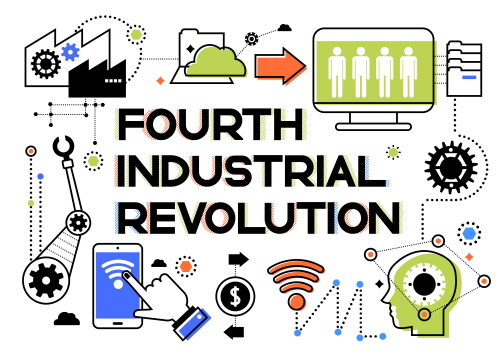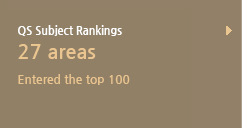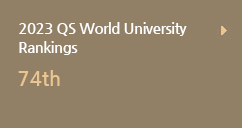Educational resources are open to everyone in the age of the 4th industrial revolution thanks to the convergence of ICBM and AI
Korea University has been selected as one of the universities that will design and offer new K-MOOC programs.

Korea University was selected as one of the universities that would develop new massive open online courses (MOOCs) on the theme of the Fourth Industrial Revolution, which have been available on the website of K-MOOC (www.kmooc.kr) since October 17th, 2017.
Korea University therefore formed a team of professors who have been involved in research, both directly and indirectly, in the field of data science and who are very familiar with the latest research findings in this area. The team is delivering a series of joint lectures on the convergence of ICBM and AI, one of the most important subjects in the Age of the Fourth Industrial Revolution.
* ICBM: Data collected by the sensors of the Internet of Things (IoT), clouds that store the data, big data analytics technologies, and mobile devices that deliver services based on these data to people
* AI: Artificial Intelligence
The team is comprised of three members: Professor Tae Su Cheong, from the Division of Industrial Management Engineering, College of Engineering; Professor Junhee Seok, from the School of Electrical Engineering, College of Engineering; and Professor Jaegul Choo, from the Department of Computer Science and Engineering, College of Informatics. These renowned experts in the field of big data and optimization-based data science deliver high quality lectures on data science. This is also a valuable opportunity for them to dissolve academic barriers between the College of Engineering and the College of Informatics, and to promote cross-disciplinary convergence, which is today an urgent imperative in the quest to cultivate new talent in these fields who can address the challenges of the future. The linking of data science to machine learning, which encompasses the mathematical fundamentals of the field and the fundamentals and challenges of AI, is a prominent feature of these lecture courses that differentiates the team's offerings from other K-MOOC programs.
The aim of the course titled ‘Mathematical Fundamentals for Data Science’ is to ensure that students acquire the mathematical knowledge which is the basis of data science, and understand the areas where data science is applied. Through this course, students can learn the basics of linear algebra and probability and statistics, and come to grips with optimization problems, as well as how to use Excel, R programs, and Python, as methods of understanding basic mathematical principles.
* Excel: A spreadsheet program developed by Microsoft typically used for calculation and data processing
* R programs: Open source software for statistical analysis and data processing, whose scope of application is being broadened to the fields of visualization, machine learning and many other areas of data processing
* Python: An advanced programming language which is independent of platforms such as Windows and Linux, which is also an open source tool for creating software applications and carrying out Big Data processing
The course ‘Machine Learning for Data Science’ divides machine learning, which is the basis of AI, into the sub-topics of supervised learning, unsupervised learning, reinforcement learning, deep learning, and visualization, so that students can understand the ways in which machine learning is applied practically. This course also demonstrates how they can create machine learning models using Excel, R programs, and Python.
Korea University took a new approach in developing these courses, as it developed curriculums that fit the needs of the Age of the Fourth Industrial Revolution, and established the new role of course ‘designer’, whose task is akin to that of a live streaming host. The designer has in-depth knowledge in the course topic and facilitates communication between lecturers and students. A lecturer, a research professor, and a designer who majored in the subject area formed teams to develop lecture content and record each lecture, in light of the course aims carrying out a comprehensive assessment of the most productive potential modes of interaction between lecturers and students in the classroom setting. In addition, a teaching assistant attends every lecture to help with students’ hands-on training.
Korea University’s new courses are characterized by student-oriented course design, the integration of online lectures and offline academic conferences held in other locations, team teaching methods, carefully considered curriculums, and offline tests. The program also hosts contests for students and offer prizes, further motivating participants.
Korea University has also considered the global aspects of e-learning. The course professors’ extensive experience of delivering lectures in English and teaching at universities abroad helps students to expand their global perspectives. The professors have also developed OpenCourseWare (OCW) and 'flipped' learning content in English. Before developing the teaching materials, Korea University consulted several Thai universities about utilizing them in international class settings, in the first initiative of its kind aimed at cooperation with overseas universities in the design and development of a K-MOOC program.
The course content will be utilized in various ways. Most notably, the College of Engineering at Korea University and the Cyber University of Korea, the online arm of Korea University, will start using it in the first semester of 2018 to educate their students about the much-debated Fourth Industrial Revolution. The cooperation of the two organizations doesn’t end there, as the Cyber University's years of video production experience and its advanced techniques and tools, such as electronic whiteboards, chroma key compositing, computer graphics, and visual aids, can serve as great assets to Korea University, enabling it to create high-quality K-MOOC programs utilizing effective educational tools which can offer students hands-on coding experience.
K-MOOC is a public educational website which was launched in 2015, which offers Korean versions of massive open online courses. In 2015, Korea University participated as a leading member of the website, developing four K-MOOC programs.
* Massive open online course (MOOC): An educational program made available over the Internet without charge to a very large number of people at the same time. K-MOOC (www.kmooc.kr) is accessible to everyone.
Korea University will continue striving to offer high quality, free online learning opportunities to anyone, anywhere and anytime, while ensuring that students can be active participants in these courses by providing them with online knowledge-sharing platforms and advanced online learning experiences.



